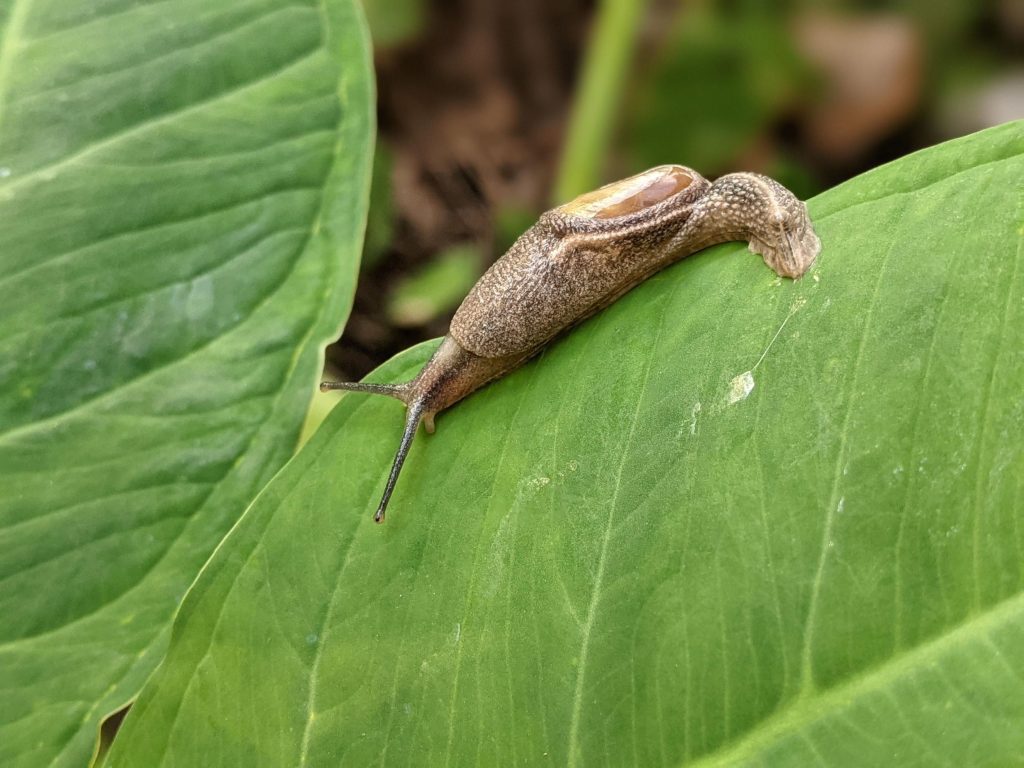Department of Health urges education on rat lung worm despite low infection rate on Kauaʻi
Franny Brewer, program manager at the Big Island Invasive Species Committee, has become an expert in dealing with the icky sounding rat lungworm, a tropical parasite that can potentially cause sickness and in some cases paralysis in humans.

She hosts educational workshops about protective measures to prevent the spread of the parasitic worm you can get from eating slugs, snails or unwashed raw vegetables.
The parasite, Angiostrongylus cantonensis, usually resides in a rat’s pulmonary arteries. When its eggs hatch, tiny larvae are shed in the animals’ feces and usually eaten by snails or slugs.
But a 2022 study by the University of Hawaiʻi at Mānoa and the University of London found that 32 species of freshwater prawns/shrimp, crayfish, crabs, flatworms, fish, sea snakes, frogs, toads, lizards, centipedes, cattle, pigs and snails also can act as carriers of the rat lungworm parasite. And, at least 13 species of prawns/shrimp, crabs, flatworms, fish, frogs, toads, lizards and centipedes have been associated with causing rat lungworm disease in humans.
While the Big Island is the primary spot for infections, rat lungworm disease is endemic in all of the islands in the State of Hawaiʻi, according to the Hawaiʻi Department of Health. There have been 7 laboratory-confirmed cases in the state from January 2024 to August 1, 2025 with zero coming from Kauaʻi.
“Every resident and visitor should be aware of rat lungworm and know the basics of protecting themselves from it,” Brewer said. “Awareness is key in increasing the sphere of protection. It’s a lot of information, but much of it is fairly straightforward.”
Controlling pest populations — specifically rats, slugs and snails — through poisonous bait, trapping, reduction of habitats, and the use of repellents is difficult but effective in preventing rat lungworm from developing through its life cycle.
“Slug jugs,” which contain six parts water to one part salt, can kill the slugs, snails and the parasite.
“Take an hour at night during the rainy season with a headlamp, look for the slugs, and collect them using gloves, chopsticks or tongs,” she said. “Then put them in the slug jug.”
An imperative preventative measure is to always inspect and clean each piece of raw vegetable and fruit. Slugs and snails often are consumed accidentally when people eat leafy greens or other produce.
When contracted, symptoms are nonspecific initially but evolve over time. Nausea, vomiting and abdominal pain may begin a few hours to a few days after ingestion, progressing to headaches and other neurological symptoms.
Rat lungworm can affects humans by causing eosinophilic meningitis when the larvae migrate to the central nervous system. In rare cases, rat lungworm can lead to being in a coma or death.
Children may exhibit irritability, fever or developmental regression.
To increase awareness of the disease and involve students in finding solutions to reduce the number of rat lung worm cases, Dr. Susan Jarvi created the Hawaiʻi Island Rat Lungworm Working Group. It conducts experiments and collects data to better understand population dynamics and the effectiveness of control efforts.
Through a grant from the Hawaiʻi Community Foundation, they developed a Department of Education-approved, for-credit professional development educational program for teachers. Jarvi taught one-day workshops and collaborated with the Hawaiʻi School Garden Hui and Hawaiʻi School Garden Network to educate students.
With limited funding now, she is currently experimenting with a “veggie wash” to reduce infection risk. Until then, Jarvi recommends using potable water when cooking.
Although active studies are ongoing, Brewer urges everyone to consistently follow common preventative measures for the safest outcome. Commonly available, over-the-counter pinworm medicine, containing pyrantel pamoate (dewormer), might mitigate the development of serious rat lungworm disease if taken within six hours of accidental ingestion.
Hilo Medical Center issued a public recommendation for pinworm medication and another drug, albendazole, an anti-worm medication, despite insufficient data on its efficacy.
“If there are no parasites in the body, the medicine causes no harm, so I always try to encourage people to keep a box at home just in case,” Brewer said. “We tell everyone that if they think they have rat lungworm to advocate for themselves, because this is newer to the medical community, especially for doctors from the mainland who haven’t been to Hawaiʻi or know of tropical illnesses.”
A new medical advisory released by the Hawaiʻi Department of Health on July 15 emphasizes heightened clinician vigilance due to nonspecific early symptoms that can develop into debilitating conditions over weeks.
Laboratory-confirmed cases for 2024 totaled seven, primarily in Hawaiʻi County, with an additional case reported in 2025. The Department of Health said that experts caution the actual disease burden is likely higher due to diagnostic challenges.
For example, a visitor contracted the disease in late 2024 after consuming unwashed greens during a Big Island hike, resulting in prolonged hospitalization.
“This isn’t just a local issue; visitors are at equal risk statewide,” said Dr. Lorrin Pang, a Department of Health epidemiologist, in a media release. “This parasite doesn’t discriminate —it’s statewide. Simple precautions like thoroughly washing produce and avoiding raw snails or slugs can prevent a vacation from turning into a nightmare.”
A new RT-PCR test at the Hawaiʻi State Laboratories Division now offers faster detection from cerebrospinal fluid.
The Department of Health says to inspect and rinse all fruits and vegetables under running potable water, and avoid soaking, because this may not remove slugs or slime. Cook susceptible foods to 165°F, freeze vegetables for at least 24 hours, and use gloves when handling potential hosts.
Furthermore, homeowners should rodent-proof their properties and deploy traps to reduce rat populations.
As cases continue to surface, the Department of Health urges individuals to seek immediate medical attention for suspicious symptoms and report them to their hotline at 808-586-4586.



